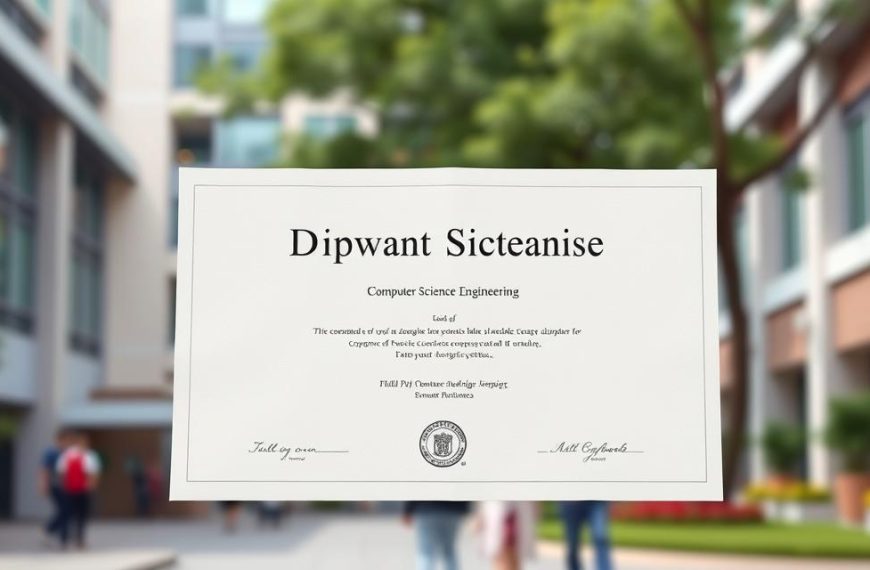The M.Tech in Computer Science is an advanced computing postgraduate degree. It offers a transformative pathway for tech professionals seeking specialised expertise. This two-year programme provides in-depth training in cutting-edge technological domains1.
The M.Tech Computer Science programme develops advanced technical skills. It prepares graduates to tackle modern technological challenges. The degree, spread over four semesters, builds deep computational knowledge and research abilities1.
This course suits B.Tech graduates in Computer Science and Engineering. Universities often require a minimum of 50% aggregate marks from recognised institutions1.
An M.Tech in Computer Science opens remarkable career paths. It positions graduates for enhanced opportunities across various tech sectors. The programme covers Cloud Computing, Information Technology, and Software Engineering1.
Graduates enjoy significant career advantages. These include improved employability and higher starting salaries. They can also pursue advanced research opportunities like doctoral programmes1.
Understanding M.Tech in Computer Science and Engineering
M.Tech in Computer Science and Engineering is a crucial academic path for professionals. UK universities offer programmes that equip students with cutting-edge digital innovation skills2.
The programme structure balances theory with practical application. It typically lasts two years, split into four semesters3.
Programme Composition
The M.Tech in Computer Science framework includes several vital components:
- Advanced theoretical modules
- Practical laboratory sessions
- Research-oriented projects
- Industry-aligned curriculum
Core Curriculum Highlights
The curriculum tackles emerging tech challenges. Key study areas include:
- Software Development
- Data Science Techniques
- Cybersecurity Strategies
- Artificial Intelligence Applications
Semester Distribution
Students follow a structured learning path across four semesters. Later semesters focus on specialised knowledge and research skills2.
The second year emphasises practical experience through intensive project work. It may include industry collaborations4.
The M.Tech programme prepares students for the dynamic challenges of the digital landscape, ensuring they remain competitive in an evolving technological ecosystem.
UK universities keep the programme structure flexible. This ensures it reflects the latest advancements in computer science and engineering4.
Programme Prerequisites and Admission Requirements
M.Tech in Computer Science programmes in UK universities have strict entry requirements. Applicants must meet high academic standards for these competitive postgraduate courses5.
- An upper second-class UK Bachelor’s degree or equivalent5
- Strong mathematical background, preferably with A-level Mathematics5
- Demonstrated proficiency in computer science or related disciplines6
English language proficiency is crucial for international students. Most universities require:
Exceptional candidates may be considered with alternative qualifications demonstrating equivalent academic potential.
The application process requires comprehensive documentation. This includes academic transcripts, references, and possibly a personal statement. Your statement should highlight research interests and career goals6.
Tuition fees differ greatly between domestic and international students. UK students may pay around £20,500 per year. International students could face fees up to £39,800 annually5.
Review specific university requirements carefully. Prepare your application materials thoroughly. Aim to submit before the typical late July deadline for October entry7.
Key Specialisations and Areas of Study
Computer science specialisations are evolving rapidly, offering exciting career paths in technology. Modern M.Tech programmes provide opportunities to explore cutting-edge domains transforming the digital world8.
Students can delve into various specialisations aligned with industry demands and emerging tech trends. The programme helps learners gain expertise while preparing for complex professional challenges9.
Artificial Intelligence and Machine Learning
AI and ML are at the forefront of tech innovation. These specialisations have seen remarkable growth, with student enrolment up by 40%8.
Key focus areas include:
- Advanced neural network architectures
- Deep learning algorithms
- Natural language processing
- Computer vision technologies
Cyber Security and Digital Forensics
Cybersecurity is vital for protecting digital infrastructures. The field has seen a 30% increase in job openings8.
Students explore:
- Network security protocols
- Ethical hacking techniques
- Digital forensic investigation
- Threat detection strategies
Data Science and Analytics
Data science remains a top specialisation. 65% of graduates secure data-related roles within six months of completing their degree8.
This specialisation covers:
- Statistical analysis
- Predictive modelling
- Big data technologies
- Machine learning applications
“The future of technology lies in specialised knowledge and innovative thinking.” – Tech Industry Expert
These specialisations place students at the forefront of technological advancement. They ensure strong career prospects in our increasingly digital world9.
What is M Tech in Computer Science: A Comprehensive Overview
M.Tech in Computer Science is a top-tier advanced programme in UK tech education. This two-year postgraduate course hones cutting-edge tech skills and deep computer science knowledge10. Students undergo rigorous training to become highly skilled technology professionals.
The programme offers a structured curriculum covering vital areas of modern computing. These include software development, data science, cybersecurity, and network technologies.
Students gain both theoretical knowledge and practical skills11. The curriculum typically includes 180 total credits, with a strong focus on projects and hands-on learning11.
Key programme highlights focus on advanced programming and research-driven modules. They also include industry-aligned skill development and interdisciplinary problem-solving.
Students develop crucial skills in emerging tech domains. This prepares them for dynamic roles in the digital economy4. Graduates are well-equipped to tackle complex tech challenges across various industries10.
The future of technology lies in continuous learning and adaptability.
M.Tech in Computer Science offers a stellar path for aspiring tech professionals. It provides practical skills and fosters innovative thinking, helping transform career trajectories4.
Career Opportunities and Industry Prospects
M.Tech in Computer Science graduates have many exciting career options in the UK tech industry. The programme gives professionals advanced skills that employers value highly. About 75% of graduates find tech jobs within 15 months.
Dynamic Job Roles in Technology
The UK tech scene offers many top positions for M.Tech graduates. These include:
- Software Development Engineer
- Data Scientist
- Cybersecurity Analyst
- AI/Machine Learning Engineer
- Research Scientist
Industry Sectors and Employment
Graduates can find work in various sectors. About 73.8% enter the IT sector12. Other sectors include:
- Business and Finance (4.3%)
- Retail and Customer Service (4%)
- Administrative Roles (2.9%)
- Other Emerging Technological Fields
Salary Prospects in the UK Tech Industry
M.Tech graduates can expect good salaries. The ranges vary by specialisation:
- Software Development Engineer: £45,000 – £75,000
- Data Scientist: £55,000 – £90,000
- Cybersecurity Analyst: £50,000 – £85,000
- AI/Machine Learning Engineer: £60,000 – £110,000
These salaries show how valuable advanced computer science skills are in the UK tech industry13. Top tech firms are keen to hire graduates with specialised knowledge14.
“An M.Tech in Computer Science opens doors to cutting-edge technological careers with exceptional growth potential.”
Academic Curriculum and Laboratory Training
UK universities offer a dynamic computer science curriculum. It combines theory and practice over two years. The programme spans 72 credits across multiple semesters15.
Top-notch computer labs support immersive learning experiences. Students engage in practical work throughout their studies15.
The curriculum includes:
- Three practical labs in the first semester15
- Two practical labs in the second semester15
- One significant project in the third semester15
- Another substantial project in the final semester15
Students can choose from 10 total elective subjects across different semesters15. This flexibility allows them to tailor their learning journey.
Partnerships with Microsoft, Infosys, and L&T provide cutting-edge practical training15. These collaborations ensure students stay current with industry trends.
The programme prepares students for real-world tech challenges16. Hands-on learning aligns directly with industry needs.
Graduates gain advanced skills in emerging technologies17. This positions them competitively in the global tech job market.
Conclusion
An M.Tech in Computer Science is a strategic path for career advancement in UK tech education. It offers chances to develop advanced skills and explore cutting-edge research. Graduates can position themselves at the forefront of technological innovation18.
This degree opens doors to various roles in technology sectors. Graduates may become software engineers, research scientists, or specialised tech professionals. The curriculum equips students with advanced skills in programming, software engineering, and AI18.
Students gain expertise in emerging tech domains and develop critical analytical skills. They also build strong professional networks. This qualification shows a commitment to continuous learning and tech excellence.
An M.Tech in Computer Science is more than just a credential. It’s an investment in your professional future. This degree gives you a competitive edge in the global tech marketplace.
FAQ
What is an M.Tech in Computer Science in the UK?
What are the typical admission requirements for international students?
What specialisations are available in M.Tech Computer Science programmes?
How long does an M.Tech programme typically last in the UK?
What career opportunities exist for M.Tech graduates?
Are research opportunities available during the programme?
What are the English language requirements?
How practical is the M.Tech curriculum?
Can international students work while studying?
What is the typical cost of an M.Tech programme?
Source Links
- https://www.sandipuniversity.edu.in/blog/why-pursue-m-tech-in-computer-science-engineering/
- https://engineering.adamasuniversity.ac.in/m-tech-in-computer-science-engineering/
- https://engineering.lingayasvidyapeeth.edu.in/blog/what-is-mtech-computer-science-engineering/
- https://mitwpu.edu.in/blog/m-tech-in-computer-science-and-engineering-course-details-eligibility–career-prospects
- https://www.ucl.ac.uk/prospective-students/graduate/taught-degrees/computer-science-msc
- https://www.ox.ac.uk/admissions/graduate/courses/msc-advanced-computer-science
- https://www.imperial.ac.uk/engineering/departments/computing/prospective-students/courses/pg/msc-computing/
- https://www.krmangalam.edu.in/blog/mtech-computer-science-engineering/
- https://www.mahindrauniversity.edu.in/blog/thrive-with-diverse-career-options-after-m-tech-in-computer-science/
- https://www.reva.edu.in/course/mtech-in-computer-science-and-engineering-full-time
- https://www.herts.ac.uk/courses/postgraduate-masters/msc-computer-science2
- https://www.prospects.ac.uk/careers-advice/what-can-i-do-with-my-degree/computer-science
- https://www.vupune.ac.in/blog/career-opportunities-after-tech-in-computer-engineering
- https://set.jainuniversity.ac.in/blogs/career-opportunities-after-mtech-computer-science
- https://www.upes.ac.in/school-of-computer-science/mtech-cse
- https://www.swamivivekanandauniversity.ac.in/mtech-vs-msc-choosing-the-right-post-graduate-program-in-computer-science
- https://duk.ac.in/m-tech-in-computer-science-and-engineering/
- https://www.reva.edu.in/blog/the-benefits-of-pursuing-an-m-tech-in-computer-science















